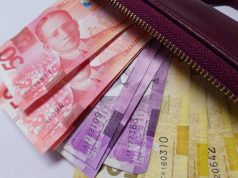BPI upsizes peso bond issuance to P25 billion on strong demand
BANK OF THE Philippine Islands (BPI) raised P25 billion via peso-denominated bonds which will be used to diversify funding sources.
The Ayala-led bank has issued P25 billion worth of fixed-rate debt papers at the Philippine Dealing & Exchange Corp. (PDEx) in Makati City on Thursday, the largest local bond listing to date.
The papers will mature in 1.25 years and carry an interest rate of 6.797% per annum to be paid quarterly until March 2020.
The issuance marks the maiden tranche of its P50-billion bond or commercial paper program approved by the lender’s board last Sept. 19.
In his speech, BPI President and Chief Executive Officer Cezar P. Consing said the amount raised is five times larger than the P5 billion it initially intended to issue, but is priced at the tight end of the original price range.
“The order book exceeded P38 billion, indicative of the trust placed by thousands of investors,” he added.
Antonio V. Paner, BPI treasurer and global markets head, said the bank wants to raise peso-denominated papers to have alternative funding sources.
“As you know, we’re diversifying… Now, we’re doing bonds so that we will have an array of funding alternatives, [and] also we want to give our clients an alternative investment option,” Mr. Paner told reporters yesterday.
Lenders can now raise fresh funds through corporate bonds with greater ease as new rules do away with having to secure approval from the Bangko Sentral ng Pilipinas.
Metropolitan Bank & Trust Co. recently raised P10 billion via fixed-rate bonds, part of its P100-billion bond and commercial paper program announced last month.
Prior to the new and “market-friendly” regulation, banks usually raise fresh funds by issuing long-term certificates of deposits, which carry a tenor of more than five years.
“The reserve requirement of a bond is much lower than the deposit. So in terms of actual cost of the bank, it’s actually cheaper than a similarly priced time deposit,” Mr. Paner added.
“The savings in the cost would be shared. Some of that would accrue on the bank because of the saving, while some of them would accrue to the investors because we’re giving them higher yields.”
The Hongkong and Shanghai Banking Corp. Ltd. acted as the sole lead manager and bookrunner of the peso bond issuance. It was also the selling agent alongside BPI Capital Corp.
BPI’s listing brings the total volume of outstanding securities listed at the PDEx to P1.002.27 trillion, floated by 50 companies.
Earlier this year, BPI completed a P50-billion rights offer, with the proceeds funding its business operations and expansion.
The bank also raised $600 million in August through a drawdown from its $2-billion medium-term note program, which it said was the largest issuance by a local lender in the offshore debt market.
Looking ahead, Mr. Paner said the lender is looking at returning to the offshore bond market next year, as they are “contemplating on [issuing] green bonds,” or debt notes specifically allotted for environmental or climate projects.
The Ayala-led bank reported a P5.98-billion net profit in the third quarter on the back of the double-digit expansion of its net interest income.
BPI shares went down 30 centavos or 0.32% to close at P93.20 apiece on Thursday. — Karl Angelo N. Vidal



